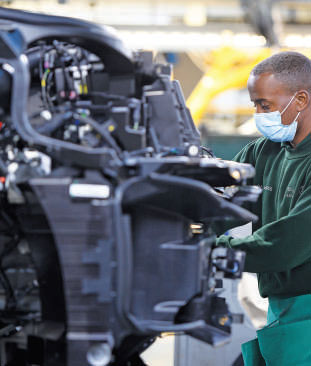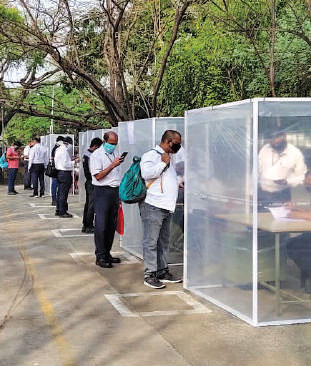TATA MOTORS
ANNUAL REPORT
2019-2020
Operating Environment
Operating Environment
Challenges abound; opportunities in play
World over, the auto industry is facing a challenging environment with the overlap of cyclical and structural issues, growing environmental concerns and unpredictable policy frameworks.
STRONG HEADWINDS IN DIFFERENT MARKETS
Tata Motors Limited
The auto industry faced strong headwinds in FY20 amidst a slowing economy due to multiple factors, such as liquidity crisis, low freight availability to cargo operators, high fuel prices, changes in axle load norms and BSVI transition, all leading to weak consumer sentiments and subdued demand across segments. The outbreak of COVID-19 towards the year-end has significantly magnified the pre-pandemic challenges.
While the overall situation still remains fluid, the general expectation is that the economy should start turning around from H2 FY21, on the back of rural recovery, normal monsoon, interventions from the government and the Reserve Bank of India, and phase-wise easing of the lockdown. Although the outlook remains uncertain, TML expects gradual recovery in sales and improvements in cash flow from H2 FY21.
Jaguar Land Rover
The UK formally exited the European Union (EU) on January 31, 2020, with a transition period to facilitate an orderly withdrawal ending on December 31, 2020. Uncertainty remains over the future terms of trade at the end of the transition period meaning we could be subject to the World Trade Organization (WTO) tariffs from January 2021. These additional costs pose an unnecessary risk to the business at a time when we have experienced unprecedented disruption caused by the COVID-19 pandemic.
A fifth of JLR’s retail sales in FY20 were in Europe, and JLR continues to significantly rely on its suppliers based in the EU, which accounts for 45% of the content of vehicles. Any barriers that pose a threat to frictionless trade and the free movement of parts and labour will likely have an adverse effect on JLR's business operations.
Trade tensions between the US and China continued during the year and although JLR experienced a recovery in retail sales in China with double-digit Y-o-Y growth in the second and third quarters, any further escalation in trade tensions between the two countries could pose further risk to sales. Further, if governments continue to enforce protectionist policies – for example, tariffs on imported vehicles – it will likely have a negative impact JLR’s business performance.
MOUNTING PRESSURE OF COMPLIANCE WITH STRICTER REGULATIONS

Tata Motors Limited
FY20 was the year of transition to BSVI. Accordingly, from April 1, 2020, all vehicles sold in India should be complying with the BSVI emissions norms. TML offers one of the largest BSVI portfolios, from sub-1 tonne to 55 tonne of GVW. TML has not only upgraded its existing CV and PV products with BSVI technology, but also enriched them in terms of value, technology, features and experience, to meet customers' aspirations.
In line with its commitment to a green and clean environment, TML, in tandem with the Tata group, has taken the lead in driving the government's vision of electrifying India and building a comprehensive and sustainable ecosystem, by leveraging the group’s rich experience and diversified competencies.
Jaguar Land Rover
Despite significant improvements in fuel economy and reduction in CO2 and NOx emissions, the demand for diesel vehicles has declined – most notably in the UK and Europe. This is largely as a result of government policy and tighter regulations, several countries having pledged to bring forward their strategies to phase out the sale of internal combustion engine vehicles altogether.
JLR continues to expand electrified powertrain options by offering full-battery electric, PHEV and MHEV on all of its new and refreshed model range, as well as by refining the latest technologically advanced diesel and petrol Ingenium engines to ensure compliance with emissions regulations.
EMERGENCE OF COVID-19

Tata Motors Limited
The COVID-19 pandemic significantly impacted the performance in the fourth quarter. As a result, profitability was impacted by ~ ₹500 crore and free cash flow by ~ ₹2,000 crore. TML responded promptly to the crisis by implementing a temporary lockdown of all its plants and instituted rigorous cost and capex controls to conserve as much cash as possible. A calibrated restart of operations has been undertaken, giving utmost priority to the safety and well-being of employees, customers and ecosystem partners.
Jaguar Land Rover
After a return to profit in the second and third quarters, JLR's PBT was impacted by £599 million and free cash flow by £767 million owing to the COVID-19 pandemic. JLR's focus has been on conserving cash and prioritising capex into key products. JLR is seeing evidence of a recovery in sales in most markets, notably China, however, there remains considerable uncertainty about the extent, speed and regional differences of any recovery. including any longer term impacts on the business and the possibility of a second wave of the pandemic.
The Solihull manufacturing facility and the Engine Manufacturing Centre in the UK, the contract manufacturing line in Graz (Austria) and the facility in Nitra (Slovakia) started production in mid-May. The Halewood facility started production in early June. The Castle Bromwich facility will reopen in due course, while the JV facility in China has been open since late February.
- Corporate Overview
- Company Profile
- Chairman’s Message
- TML CEO and MD’s Message
- JLR CEO’s Message
- New Launches
- Key Highlights
- Performance Review
- Business Model
- Operating Environment
- Risks and Opportunities
- Stakeholder Engagement and Materiality
- Tata Motors Limited – Turnaround 2.0
- Jaguar Land Rover – Transformation
- Tata Motors Finance
- Sustainability Focus
- Environmental Responsibility
- Social Responsibility
- Corporate Governance
